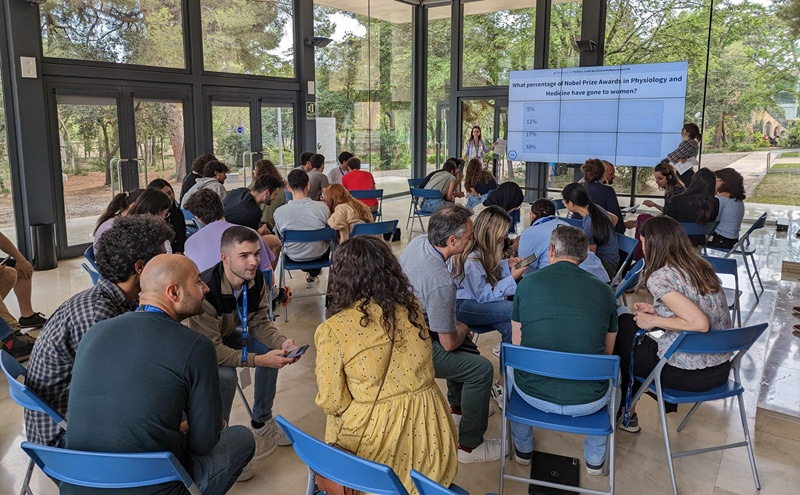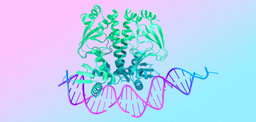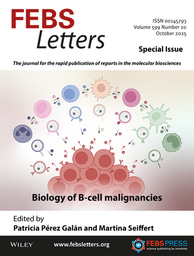Bioinfo4Women: Empowering women in bioinformatics research

The gender gap in STEM persists as a systemic issue, characterised by underrepresentation at all career stages, from early career researchers to leadership positions. This disparity is further exacerbated by horizontal segregation and implicit biases that limit opportunities for women (1,2). In the field of bioinformatics, a rapidly expanding area with significant societal implications, this imbalance is particularly concerning. The Bioinfo4Women (B4W) programme, based at the Barcelona Supercomputing Center (BSC), was established in 2018 to directly address these challenges and foster a more equitable and inclusive research environment.
Programme pillars
Over the years, B4W has continued to expand, attracting the interest of various individuals and organisations both within and beyond Spain, and broadening its objectives even further. Nowadays, B4W's core mission rests on four interconnected pillars:
- Career development & support: B4W provides direct support to women bioinformaticians and computational biologists at all career stages. This includes mentorship opportunities, professional development workshops, and financial assistance for conference attendance and research projects. A key initiative is the B4W Fellows Programme, which supports the transition of women from postdoctoral researchers to independent research positions, providing resources for regular visits to the BSC and fostering scientific collaborations. A new mobility programme for senior women researchers is scheduled to launch in 2025.
- Community building and networking: B4W fosters a strong sense of community by creating opportunities for women to network and collaborate internationally. This includes regular seminars (3) featuring presentations from leading women researchers, along with networking events and workshops. These initiatives cultivate a supportive environment where women researchers can share experiences, build collaborations, and amplify their research impact. The annual “BSC Life Sciences Open Day by B4W”, celebrating International Day of Women and Girls in Science, further contributes to this.
- Raising awareness of gender bias: A crucial component of B4W's approach is to raise awareness about the pervasive nature of sex and gender biases in health and technology in particular AI applications. This is achieved through workshops, seminars, and targeted outreach activities focused on highlighting existing biases in research, data collection, and algorithm development. The programme’s Women’s Health Awareness Week (WHAW) initiative, commemorated annually since 2022, specifically addresses health biases affecting women.
- Integrating sex and gender dimension into biomedical research: B4W actively promotes the integration of sex and gender considerations into biomedical research. This includes encouraging researchers to consider sex and gender as biological variables in their studies, promoting the use of diverse and representative datasets, and developing methodologies to mitigate sex and gender bias in research projects. The programme's development of training materials published as the "How to Integrate the Sex and Gender Dimension in Life Sciences Research" handbook (4), in collaboration with BBMRI and EATRIS, further exemplifies this commitment.
Research activities
Beyond career development, B4W actively researches sex and gender biases in biomedicine and AI. This research has generated publications (5,6,7,8,9), including a book and several scientific articles on the topic, and involves participation in ELIXIR biohackathons and other studies examining biases in datasets and research practices. The BAIHA project focuses specifically on assessing gender bias in AI health tools. The AHEAD project (starting 1 January 2025) will develop a methodology to evaluate AI-based systems for biomedical and healthcare applications, ensuring compliance with legal, ethical, technical, scientific, cultural, economic, and regulatory standards.
Impact and future directions
B4W has significantly contributed to increased gender equality within the BSC and has served as a model for other institutions. Future endeavors include expanding international collaborations, assessing the programme's economic and social impact, and strengthening partnerships to disseminate research findings and address women's health issues. B4W aims to serve as a model for fostering inclusivity and equity in STEM globally.
Conclusion
The Bioinfo4Women programme serves as a powerful example of a multifaceted approach to promoting gender equality in bioinformatics. By combining targeted career support, community building, bias awareness, and research initiatives, B4W effectively addresses the systemic barriers faced by women in STEM, creating a more inclusive and equitable research environment. The programme’s success highlights the significant impact of comprehensive interventions and underscores the need for similar initiatives across STEM fields to foster a truly equitable and inclusive scientific community.

an initiative organized around the International Day of Action for Women’s Health (28th May).
References
- https://op.europa.eu/es/publication-detail/-/publication/67d5a207-4da1-11ec-91ac-01aa75ed71a1
- https://apre.it/wp-content/uploads/2023/02/eu-support-to-strengthen-gender-equality-in-stem-KI0422202ENN.pdf
- https://www.youtube.com/playlist?list=PLbABsNMD2jhxBw0PZkeiM8b2cRSLgjOYs
- https://tess.elixir-europe.org/materials/handbook-integration-of-the-sex-and-gender-dimension-in-life-sciences-research
- Cirillo, D., Catuara-Solarz, S., Morey, C., Guney, E., Subirats, L., Mellino, S., Gigante, A., Valencia, A., Rementeria, M. J., Chadha, A. S., & Mavridis, N. (2020). Sex and gender differences and biases in artificial intelligence for biomedicine and healthcare. Npj Digital Medicine, 3(1). https://doi.org/10.1038/s41746-020-0288-5
- Cirillo, D., Solarz, S. C., & Guney, E. (Eds.). (2022). Sex and gender bias in technology and artificial intelligence: Biomedicine and healthcare applications. Academic Press.
- Ruiz-Serra, V., Buslón, N., Philippe, O. R., Saby, D., Morales, M., Pontes, C., Andirkó, A. M., Holliday, G. L., Jené, A., Moldes, M., Rambla, J., Valencia, A., Rementeria, M. J., Cortés, A., & Cirillo, D. (2024). Analyzing sex imbalance in EGA and dbGaP biological databases: Recommendations for better practices. iScience, 27(10), 110831. https://doi.org/10.1016/j.isci.2024.110831
- Philippe, O., Flores Rodero, M., Furtick, C. Y., Planas Simón, L., Ferretti, M. T., Santuccione Chadha, A., Subirats Maté, L., Cirillo, D., & Rementeria, M. J. (2024). Abortion and Miscarriage on Twitter: Sentiment and Polarity Analysis from a gendered perspective. ACM Web Science Conference, 311–319.
- https://www.europarl.europa.eu/RegData/etudes/STUD/2022/729541/EPRS_STU(2022)729541_EN.pdf
Photo by the Bioinfo4Women programme.





Join the FEBS Network today
Joining the FEBS Network’s molecular life sciences community enables you to access special content on the site, present your profile, 'follow' contributors, 'comment' on and 'like' content, post your own content, and set up a tailored email digest for updates.